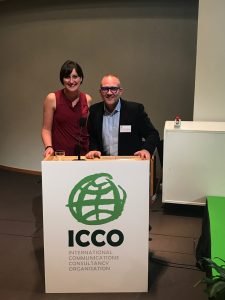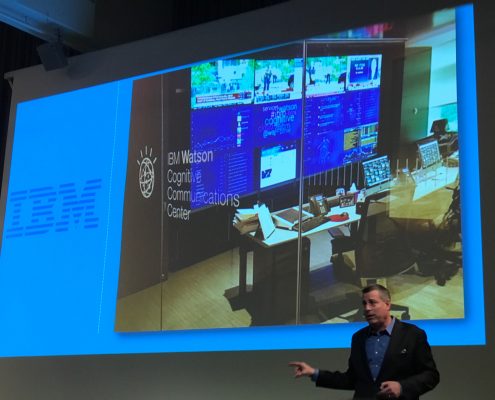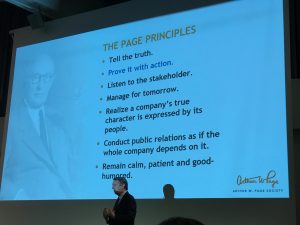From left, Charlene Corrin, GM from ICCO and Rami Kangas, Drama Queen Communications/GlobalCom PR Network
“If something matters enough, the news will find you”. Something in those lines was said by Ketchum CEO and chairman Rob Flaherty in his opening keynote of ICCO global summit 2017 in the beginning of October. Flaherty’s note was pointed towards the shift how news and messages are now delivered and received – by sharing. Recommendation from a friend or an online review can easily be the strongest message you’ll get. This has a huge impact on the way we do business.
ICCO gathered more than 300 PR professionals from over 30 countries. The Summit is held annually and this year it was in Helsinki, Finland (home of Drama Queen Communications). Main topic for the Helsinki summit was “leading in a transformational world”. That was put into practise through innovative presentations, insightful panels without forgetting key aspects of networking. Like former ICCO president Maxim Behar put it: “The world is changing and I am sure you will agree with me that those changes made our business, public relations, one of the most dynamic in the world. We all know that everything we were doing just a couple of years ago does not work anymore and thousands of new tools and approaches have turned our business upside down.”
In his speech, Rob Flaherty pointed that brand is as brand does. At the same time – for us PR pros – it means embracing completely new skills in a field where 95 % of business is about promise making. But not only that, expectations are also shifting rapidly. People now expect firms to answer questions in almost every conceivable level. This is where we meet the transformation of skills. We see creative newsrooms, cognitive communications centers, general companies becoming media companies, omnichannel thinking, new functions here and there, new titles, like innovation directors, intelligence directors, social business directors, not to mention makers.
In a world where google algorithm changes twice a day, what can you trust? Or let’s put it this way: how can you find the right media channels or effective ways to tell your story, targeted at the right groups? Flaherty used influencers and systematic influencer maps as an example. Both of which are new platforms we need to be able to do business with. The challenge of these new skills and things we need to communicate to our clients would be this: as PR pros we must let our clients be aware of the intersection of our capabilities (media and public relations to social media, marketing actions to analytics and SEO, creative concepts to data science and market research). These are the new interfaces through which we deliver our most precious thing, the media you can’t buy.
The importance of action and the living message
Roger Bolton, president of Arthur W. Page Society, started by dropping The Basics: the principles, which I can sign without hesitation. Tell the truth, prove it with action, listen to the stakeholder, manage for tomorrow, realize a company’s true character is expressed by its people, conduct relations as if the whole company depends on it, remain calm, patient and good-humoured. So obvious. Everything tends to become easier after abiding by the first principle; tell the truth.
Though that can be difficult as we live the great age of deception, fake news and parallel facts.
Once again, we come back to what Flaherty spoke of at the beginning about a brand being experienced through what the brand does. Or how Bolton puts it; prove it with action.
One of the most amusing yet useful keynotes came from John Brown from Hotwire. He was busting the myths of communications and marketing. For example. Media relations is bad… if it is the only solution. Or, digital is good… “No it isn’t, if the content is bad, it is still bad” he reminded.
Digital whatever it is, is still a platform or a channel and at the end of the day it is all about meeting people, talking, communicating, creating relations, it is about doing business. And how about this: all work must lead to an action for it to be integrated! Not necessarily, says mr. Brown and points towards Lego making a movie, just for the fun of it (budget of $60 million/box office $469.2 million).
Brown’s keynote emphasized the importance of understanding how fast-minded our absorption capacity has become and how difficult it is to concentrate for extended periods of time. While marketers are talking about Customer journey, we should wait and ask, where this journey is taking us, what is the destination. People more often than not want things fast, right here, right now.
Like Mr. Flaherty and Mr. Bolton, also Mr. Brown brought out the question of actions. In his words, living your message is what counts. Other way to put it; you have to make it a living thing. Message without action to back it up doesn’t count.
Helsinki Declaration and the path of ethics
ICCO summits surely are one of the most important events to follow in our industry. They are about showing the path by talking, discussing, listening and learning. Even by making declarations against misleading practises. According to the Helsinki Declaration ten principles of ethical behaviour should be a cornerstone of the PR industry.
Helsinki Declaration of 10 Principles:
- To work ethically and in accordance with applicable laws
- To observe the highest professional standards in the practice of public relations and communications
- To respect the truth, dealing honestly and transparently with employees, colleagues, clients, the media, government and the public
- To protect the privacy rights of clients, organisations, and individuals by safeguarding confidential information
- To be mindful of their duty to uphold the reputation of the industry
- To be forthcoming about sponsors of causes and interests and never engage in misleading practices such as ‘astroturfing’
- To be aware of the power of social media, and use it responsibly
- To never engage in the creation of or knowingly circulate fake news
- To adhere to their association’s code of conduct, be mindful of the codes of conduct of other countries, and show professional respect at all times
- To take care that their professional duties are conducted without causing offence on the grounds of gender, ethnicity, origin, religion, disability or any other form of discrimination.
The Holmes way
Besides declarations, it is always instructive and fun listening to Paul Holmes. He started by reminding the audience about the nature of channels to communicate and using them as transitional mind forms. In the past we might have called ourselves television agencies, whereas today many agencies define themselves as digital or social ones. In 50 years it might be considered as absurd as being a television agency now. The key is understanding that we are creating channels and campaigns to communicate messages using all the possible and yet to be imagined forms of human interaction.
Surprisingly, for Paul Holmes public relations is clearer than ever; “it is not the production of press releases or new stories, it is not defined by the channel, more likely we are defined by relationship”, he says. His point being the challenges of ever changing environment where both ad agencies and digital agencies do business.
“The thing we can come back to is the idea of creating a relationship”, says Holmes. And that is creating, managing, nurturing and leveraging long term, mutually beneficial relationships.
A few Holmes tips where we need to acknowledge disciplines we are competing with would be creativity, channels and technology, data and insight capabilities. Holmes highlights the importance of data with this linear equation:
“The person with the best data will have the best insight, the person with the best insight will have the best strategy, the person with the best strategy will be the most valued and trusted adviser to the client – you want to be that person”, Holmes states.
*
Here you will find some links to the extra content done Haaga-Helia students from Helsinki: http://www.iccosummithelsinki.org/blog
Paul Holmes was also writing some memos, which can be found here:




